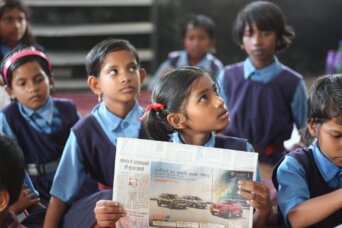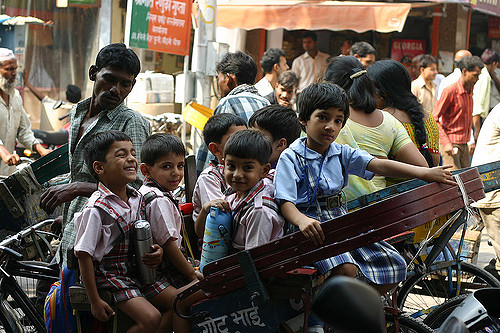- About
- Topics
- Picks
- Audio
- Story
- In-Depth
- Opinion
- News
- Donate
- Signup for our newsletterOur Editors' Best Picks.Send
Read, Debate: Engage.
| topic: | Child rights |
|---|---|
| located: | India |
| editor: | Bindu Gopal Rao |
Giving up successful corporate careers to make a positive impact in the social development space is something that is harder than one would imagine. However, Binu Verma and Ramesh Balasundaram did just that due to their shared passion to develop solutions that could bring a grassroot-level impact.
And what better field to impact than that of education? After detailed research on the public-school education space in India, the couple set up the NGO Bal Utsav in 2009 as a museum school or ‘a bridge school’ for children from lower-income households who had dropped out of government schools. The children were picked up and dropped, taught to read and learn key concepts, including maths and sciences and were given free meals. Over time, the couple realised that providing access to quality education to every single child in the country would need an overhaul of the existing government-school education. With 70 percent of children attending government schools, Bal Ustav began to adopt government schools across Karnataka in 2012 to engender a holistic reformation.
This was done through a 360-degree school revitalisation program focusing on four key areas of interventions. Firstly, school infrastructure was addressed by repairing, building and maintaining schools, including bringing technological interventions and setting up smart classes to ensure students would have access to a quality learning environment. Secondly, through WASH (Water, Sanitation & Hygiene), they ensured all students would have access to clean water, private bathrooms and good hygiene practices. Thirdly, by creating age-appropriate materials to enhance teaching, they provided training to teachers and learning interventions through innovative and interactive methodologies. Lastly, they also launched scholarships for students.
After a decade of tirelessly working towards this cause, over 200 government schools in Karnataka have been revitalised and nearly 800,000 students have benefited through their flagship programs. In fact, after the first COVID lockdown was announced, they launched the iShaala program by embedding the blended learning model into the program. Started in December 2020, the ‘smart infrastructure’ developed with the help of smart devices and Ed-tech content led to continued learning in Bal Utsav-supported rural schools, either in their respective school campuses or remotely at home, or in the form of community learning. The convenience of learning saw a significant increase in reverse migration with kids in Shivamogga moving to government schools from other private institutions.
Bal Utsav has partnered with over 100 corporations to transform public school education and a few of them have also adopted schools in districts like Shivamogga, which has helped the NGO implement a blended learning model. Looking ahead, the NGO hopes that the iShaala model can be rolled out nation-wide if multiple players come together to bring in a holistic impact on public education in India. After all, making education inclusive and accessible to children is the best way to secure both their future, as well as that of the country.
Photo by Jaikishan Patel

